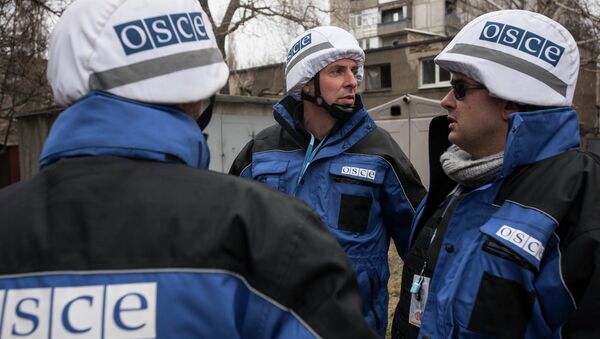"We want of course and what we always urge, is that any reader of our reports, but in particular the signatories, should react to the findings the observing mission has been taken. That is clearly an appeal that we make all the time is that while we report, and we don't see everything, but what we see should be acted upon," Hug said.
He highlighted that there were some responses to the reports, and mentioned head of self-proclaimed Donetsk People's Republic Denis Pushilin, who had returned the SMM unmanned aerial vehicle (UAV) seized by the militia in late February.
"A feedback is one thing, but action on the ground, if we report that we see tanks in Avdiivka or howitzers in Yasinovata, and we have seen them, it would be good if then the JCCC [Joint Centre for Control and Co-ordination], or the sides would make sure that these tanks, these howitzers disappear and then report, that the howitzers in Yasinovata have been taken away, they are now in this or that area, you can go and check if they are there or not. That type of interaction is still missing," Hug added.
The Organization for Security and Co-operation in Europe's Special Monitoring Mission to Ukraine will not state its opinion on armed police mission establishment in Donbass until the decision is made on the issue, Alexander Hug said.
"The second question about the proposal that some have made on the armed police mission. All I can say there, that it is a decision that is not up to the SMM to take. We can only make an assessment of this proposal once the decision is made," Hug said.
The deputy chief monitor said that the scale and the mandate of the armed police mission would only be known after such decision is made.
"And until that happens I could only speculate on a vague proposal, which would not lead to any conclusive assessment. At this stage, this will have to be discussed at the [OSCE] Permanent Council," Hug added.
Kiev has called for the creation of a police mission tasked with monitoring the situation in Donbass.
In late December, Russia's Permanent Representative at the OSCE Alexander Lukashevich said that an armed police mission might undermine the stability in the region. In January, Russian Foreign Minister Sergey Lavrov said the proposal to deploy an OSCE police mission in Donbass contradicted the Minsk peace agreements.
The Organization for Security and Co-operation in Europe's (OSCE) Special Monitoring Mission (SMM) to Ukraine cannot control the way other governments use the information and reports it provides, the mission's Principal Deputy Chief Monitor Alexander Hug told Sputnik, adding that the blame game would not help find a solution.
"I cannot control how they make use of our reports and our briefings to them. We have a clear stance that we report on both sides in our reports, but also in our briefings with them. In those discussions there is clear interest in terms of the compliance by the government with Minsk, and we have no censorship built in in terms of our interaction," Hug said.
According to Hug, the only way to solve the conflict was to "accept the facts" provided by the SMM and then "to find measurements to remove those violations" that both sides committed. He stressed violations of the Minsk agreements came both from Kiev forces and Donbas militia.
"We clearly state and we always have said that we are impartial with regard to Minsk violations… It doesn't matter from which side the violation comes, it is a violation, and it is what we will be reporting," Hug added.
The OSCE Special Monitoring Mission to Ukraine was deployed in March 2014 to observe and report on the situation in the country.
In 2014, Kiev launched a military operation against self-proclaimed Donetsk People's Republic and neighboring People’s Republic of Luhansk, when they refused to recognize the new Ukrainian government that came to power after what they perceive to be a coup. In 2015, the sides to the conflict reached a ceasefire agreement in Minsk after the negotiations brokered by the leaders of Russia, Ukraine, France and Germany. The Minsk accord stipulated prisoners exchange and withdrawal of heavy weaponry from the contact line in eastern Ukraine, among other provisions.
However, the Minsk agreements have repeatedly been violated, with conflict escalating near the southeastern Ukrainian towns of Avdiivka and neighboring Yasynuvata in late January.
Never miss a story again — sign up to our Telegram channel and we'll keep you up to speed!



